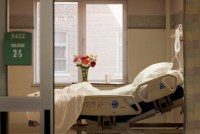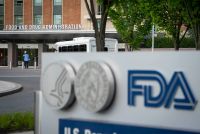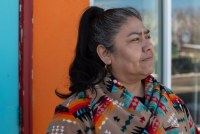Latest KFF Health News Stories
The Nation’s 911 System Is on the Brink of Its Own Emergency
911 outages have hit at least eight states this year. They’re emblematic of problems plaguing emergency response communications due in part to wide disparities in capabilities and funding.
El sistema de emergencias del 911 está al borde del colapso
Mientras que algunos estados, ciudades y condados ya han modernizado sus sistemas de emergencia del 911 o han hecho planes para actualizarlos, muchos otros están rezagados.
Young Gay Latinos See Rising Share of New HIV Cases, Leading to Call for Targeted Funding
Since being diagnosed with HIV in 2022, Fernando Hermida has had to move three times to access treatment. A KFF Health News-Associated Press analysis found gay and bisexual Latino men account for a fast-growing proportion of new diagnoses and infections, showing they are falling behind in the fight against HIV.
Un análisis de KFF Health News-Associated Press halló que los hombres latinos homosexuales y bisexuales representan una proporción cada vez mayor de nuevos diagnósticos e infecciones, lo que demuestra que los están dejando atrás en la lucha contra el VIH.
Presidential Election Could Decide Fate of Extra Obamacare Subsidies
Most states that saw enrollment in the Obamacare marketplace double from 2020 to 2024 are in the South. But the enhanced federal subsidies that attracted people with $0 premiums and low out-of-pocket costs will expire next year.
The South Can Be a Dangerous Place To Be Black and Pregnant
In much of the developed world, dying while pregnant or delivering a child is practically unknown. In Australia, for example, there were just 3 maternal deaths for every 100,000 live births in 2021. But that’s not the case in the American South. And especially not for Black women. In South Carolina, Black women were more […]
An NIH Genetics Study Targets a Long-Standing Challenge: Diversity
In his 2015 State of the Union address, President Barack Obama announced a precision medicine initiative that would later be known as the All of Us program. The research, now well underway at the National Institutes of Health, aims to analyze the DNA of at least 1 million people across the United States to build a diverse health database. The key word there is “diverse.” So […]
Genetics Studies Have a Diversity Problem That Researchers Struggle To Fix
Researchers in Charleston, South Carolina, are trying to build a DNA database of 100,000 people to better understand how genetics affects health risks. But they’re struggling to recruit enough Black participants.
Becerra Joins the Fray Over Reproductive Rights
Health and Human Services Secretary Xavier Becerra is racking up frequent-flier miles as he hopscotches the country to highlight health issues the White House hopes will become pivotal for voters this year — none more so than reproductive rights. “No woman today should fear [not having] access to the care that she needs. President Biden […]
City-Country Mortality Gap Widens Amid Persistent Holes in Rural Health Care Access
People in their prime working years living in rural America are 43% more likely to die of natural causes, like diseases, than their urban counterparts, a disparity that grew rapidly in recent decades, according to a new federal report.
Ten Doctors on FDA Panel Reviewing Abbott Heart Device Had Financial Ties With Company
Most of the doctors the FDA tapped to advise it on an Abbott medical device had financial ties to the company. The FDA didn’t disclose the payments.
Medical Debt Affects Much of America, but Colorado Immigrants Are Hit Especially Hard
Colorado is ahead of the curve on policies to prevent medical debt, but the gap between the debt load in places inhabited primarily by people of color versus non-Hispanic white residents is greater than the national average.
La deuda médica afecta a gran parte de EE.UU., pero en especial a inmigrantes en Colorado
Las luchas del área reflejan una paradoja sobre Colorado. En general, la carga de deuda médica del estado es más baja que la de la mayoría. Pero las disparidades raciales y étnicas son más amplias.
Históricamente, las enfermedades vinculadas al abuso del alcohol han afectado más a los hombres. Pero datos actuales de los Centros para el Control y Prevención de Enfermedades (CDC) muestran que las tasas de muerte por esta causa están aumentando más rápido entre las mujeres que entre los hombres.
More Women Are Drinking Themselves Sick. The Biden Administration Is Concerned.
Historically, alcohol use disorder has disproportionately affected men. But targeted advertising and changes in societal norms over the past 50 years have led to an upsurge in alcohol-related diseases and deaths among women. “It’s a very taboo topic,” one expert said.
Telehealth Sites Promise Cure for ‘Male Menopause’ Despite FDA Ban on Off-Label Ads
Most healthy men produce sufficient testosterone as they age. Yet online ads and telehealth sites are promoting testosterone drugs with flawed promises of boosting libido and busting stomach fat.
GOP-Led States Expand Crackdowns on Transgender Care
South Carolina’s legislature is poised to pass a bill prohibiting doctors from offering some health-care services to transgender minors — part of a new wave of anti-trans legislation from Republican-led states. The South Carolina bill, which passed the state House of Representatives in January and is under consideration in the Senate, would bar health-care providers […]
Lawsuits Claim South Carolina Kids Underwent Unnecessary Genital Exams During Abuse Investigations
Lawsuits allege that several children under 18 in South Carolina have undergone examinations of their private parts during child abuse investigations — even when there were no allegations of sexual abuse. There’s a growing consensus in medicine that genital exams can be embarrassing, uncomfortable, and even traumatic.
Southern Lawmakers Rethink Long-Standing Opposition to Medicaid Expansion
While many Republican state lawmakers remain firmly against Medicaid expansion, some key leaders in holdout states are showing a willingness to reconsider. Public opinion, financial incentives, and widening health care needs make resistance harder.
Insurance Doesn’t Always Cover Hearing Aids for Kids
California’s governor vetoed a bill extending insurance coverage for kids with hearing loss, but most states now require it.




















